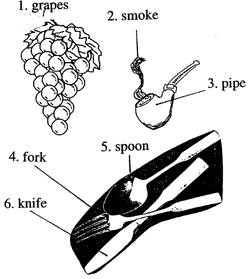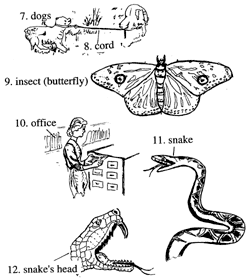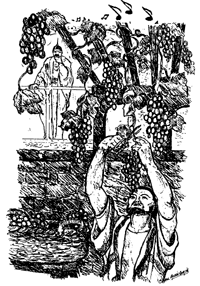Unit 26: Questions
質問
Pictured Words
描かれた単語
New Words
新しい単語

| 1. grapes
ブドウ |
| 2. smoke
煙 |
| 3. pipe
管 |
| 4. fork
フォーク |
| 5. spoon
スプーン |
| 6. knife
ナイフ |

| 7. dogs
犬 |
| 8. cord
コード |
| 9. insect (butterfly)
Insect (butterfly) |
| 10. office
オフィス |
| 11. snake
ヘビ |
| 12. snake's head
頭部を蛇行させた |
Nouns
名詞
ビール
病院
罰
夏
配分
昆虫
煙
傾向
犬
ナット
ヘビ
タバコ
指
オフィス
スープ
ブドウ
所有者
スプーン
政府
ポテト
砂糖
Adjectives
形容詞
厚く
Sayings
格言
Are these potatoes for sale?
これらのポテトは販売のためであるか。
Is there a snake in this garden?
この庭のヘビがあるか。
Is it possible to see any smoke at that distance?
その間隔で煙を見ることは可能であるか。
Is a butterfly an insect?
蝶は昆虫であるか。
What is that dog hanging on to you for?
その犬は何のためのあなたに掛かっているあるか。
When should one keep out of the office?
1 つはいつオフィスから保つべきであるか。
Why have I to make a request to see your office?
なぜあなたのオフィスを見る要求をする私を持ちなさいか。
Why are there insects in those potatoes?
なぜそれらのポテトに昆虫があるか。
Who is able to take his food with a spoon, or must you have a knife and fork ?
だれがスプーンが付いている彼の食糧を取れるまたはナイフおよびフォークがなければならないか。
Which dogs are not able to go on the road?
どの犬が道で行けないか。
How will we go to the hospital?
私達はいかに病院に行くか。
Questions
質問
When it is your desire to get information you may put a question to your hearer by means of a simple change of word order.
それが情報を手に入れるあなたの欲求のとき語順の簡単な変更によってあなたの聴衆に質問を置くことができる。
You make an exchange between the order of the operator and its subject in the statement and so turn it into a question:
オペレータの順序と声明の主題間の交換を及びする従って質問にそれを回しなさい:
| Statement
| Question
|
| We are waiting for another.
私達は別のものを待っている。 | Are we waiting for another?
私達は別のものを待っているか。 |
| This is not the son of Joseph.
これはヨセフの息子でない。 | Is not this the son of Joseph?
これはヨセフ息子でないか。 |
| It is right to do good on the sabbath not to do evil.
悪をしないことsabbath のよいすることは右である。 | Is it right to do good on the sabbath or to do evil?
sabbath のよいすることは右であるまたは悪はか。 |
| It is possible for one blind man to be guide to another.
1 つの盲目人が別のものへのガイドであることは可能である。 | Is it possible for one blind man to be guide to another?
1 つの盲目人が別のものへのガイドであることは可能であるか。 |
There are other ways of putting a question, of course.
質問を置く他の方法が、当然ある。
You may use the helpers "who, which, what, why, when and will"
意志"時なぜか何、だれか助手を" 使用することができ、、
who
だれか
who is this, who has no respect for God?
神のための点を有しないこれはだれである、か。
who is my neighbour?
私の隣人はだれであるか。
who then will be the owner of all the things
すべての事の所有者はそれからであるかだれ
which
どれか
which you have got together?
どれ一緒に持っているか。
which of these three men was neighbour to the man?
この3 人のどれが人に隣だったか。
which of you will give a stone to his son for bread?
パンのための彼の息子にあなたのどれが石を与えるか。
for which of those works are you stoning me?
それらの仕事のどれのために私に投石しているか。
what
何
what is your name?
あなたの名前は何であるか。
what are they like?
それらはどんな風ですか。
what profit will a man have if he gets all the world, but undergoes loss or destruction himself?
人はどんな利益彼が世界すべてを得ればが持ったり、損失か破壊彼自身を経るか。
why
なぜ
why do you take note of the grain of dust in your brother's eye?
なぜあなたの兄弟の目の塵の穀物のノートを取るか。
why are you turned away from me?
なぜ私から回るか。
why are you troubled in me?
なぜ私で悩むか。
when
時
when will these things be?
これらの事はいつあるか。
when did we see you in need of food?
私達はいつ食糧を必要として会ったか。
when did we see you wandering?
私達はいつさまようことを見たか。
will
意志
will you give us teaching about prayer?
私達に祈りについての教授を与えるか。
will you give him a snake?
彼にヘビを与えるか。
will you take your rest among the flocks?
群間のあなたの残りを取るか。
It seems a fair statement, however, that these are only words which indicate a question is to be put.
それはこれらが質問を示す唯一に単語であること公平な声明のようである、しかし、置かれることはある。
They do the same thing as in the first form of question by changing the order of the operator and its subject.
それらはオペレータおよび主題の順序の変更によって質問の表版のと同じ事をする。
But they let it be known that a question is coming.
しかしそれらは質問が来ていることそれに知らせる。
Another word that does that is "how"
それをするもう一つの単語は"いかに" ある
how
いかに
how then will he keep his kingdom?
彼はいかにそれから彼の王国を保つか。
how may we give food to such a number of people?
私達はいかにそのような何人かの人々に食糧を与えてもよいか。
how long will I put up with you?
どの位私は我慢するか。

Naboth's Vine-Garden
Naboth のツル庭
Now Naboth the Jezreelite had a vine-garden in Jezreel, near the house of Ahab, King of Samaria.
今Naboth にAhab の家、Samaria の王の近くでJezreel でJezreelite ツル庭が、あった。
And Ahab said to Naboth, give me your vine-garden so that I may have it for a garden of sweet plants, for it is near my house;
そしてAhab はNaboth に私に甘い植物の庭のためのそれがあるなぜなら私の家の近くにあるように、与える私にあなたのツル庭を言った;
and let me give you a better vine-garden in exchange, or, if it seems good to you, let me give you its value in money.
そしてそれがあなたによいようである私を、お金の価値を与えることを許可しなさい私を交換のよりよいツル庭を、または与えることを、許可しなさい。
But Naboth said to Ahab, By the Lord, far be it from me to give you the heritage of my fathers.
しかしずっと私の父の相続財産を与えるとNaboth は、私からのならば主によって、Ahab に言った。
So Ahab came into his house bitter and angry because Naboth the Jezreelite had said to him, I will not give you the heritage of my fathers.
そうAhab は苦い彼の家に入って来、Jezreelite が彼に言ったNaboth ので怒っている、私は私の父の相続財産を与えない。
And stretching himself on the bed with his face turned away he would take no food.
そして彼の表面が付いているベッドの彼自身を伸ばすことは彼を取り去る食糧を回さなかった。
But Jezebel, his wife, came to him and said, Why is your spirit so bitter that you have no desire for food?
しかしJezebel 、彼の妻は、食糧のための欲求を有しないほど来、言ったり、なぜあなたの精神は彼に苦いか。
And he said to her, Because I was talking to Naboth the Jezreelite, and I said to him, Let me have your vine-garden for a price, or, if it is pleasing to you, I will give you another vine
そして彼は彼女に私がNaboth にJezreelite を話していた、私は彼に言ったので、言い、私を持っている価格のためのあなたのツル庭を許可すれば、あなたに楽しければ、私は別のツルを与える
Then Jezebel, his wife, said, Are you now the ruler of Israel?
そしてJezebel の言われる彼の妻今イスラエル共和国の定規であるか。
get up, take food, and let your heart be glad;
起き、食糧を取り、そしてあなたの中心が嬉しいがあるようにしなさい;
I will give you the vine-garden of Naboth the Jezreelite.
私はNaboth のツル庭をJezreelite 与える。
So she sent a letter in Ahab's name, stamped with his stamp, to the responsible men and the chiefs who were in authority with Naboth.
そうNaboth の権限にあった責任者責任がある人におよび彼女は彼のスタンプと押されたAhab の名前の手紙を送った。
And in the letter she said, Let a time of public sorrow be fixed, and put Naboth at the head of the people;
そして手紙で彼女は公共の悲哀の時間が言ったり、固定であるように、そして人々の頭部にNaboth を置くとした;
and get two good-for-nothing persons to come before him and give witness that he has been cursing God and the king.
そして彼が神及びずっと王を罵倒していること2 つのgood-for-nothing 人を彼の前に来、証人を与えるために得なさい。
Then take him out and have him stoned to death.
それから取り、彼を死に投石しなさい。
So the responsible men and the chiefs who were in authority in his town, did as Jezebel had said in the letter she sent them.
Jezebel が彼女がそれらを送った手紙で言ったので彼の町の権限にあった責任者およびそう責任がある人は、した。
They gave orders for a day of public sorrow, and put Naboth at the head of the people.
彼らは公共の悲哀の1 日順序を与え、人々の頭部にNaboth を置いた。
And the two good-for-nothing persons came in and took their seats before him and gave witness against Naboth, in front of the people, saying, Naboth has been cursing God and the king.
そして2 つのgood-for-nothing 人は入り、彼らの座席を前に彼取り、そしてNaboth に対して証人を、人々、格言の前に与えた、Naboth は神及びずっと王を罵倒している。
Then they took him outside the town and had him stoned to death.
そして彼らは町の外の彼を取り、死に投石してもらった。
And they sent word to Jezebel, saying, Naboth has been stoned and is dead.
そして彼らはJezebel に単語、格言を送った、Naboth は死んでいる投石され。
Then Jezebel, hearing that Naboth had been stoned and was dead, said to Ahab, Get up and take as your heritage the vine-garden of Naboth the Jezreelite, which he would not give you for money, for Naboth is no longe
そしてJezebel の、Naboth があなたの相続財産としてNaboth のツル庭を彼がお金のための与えないJezreelite 投石され、死んで、Ahab に言われて、起こし、そして取ることを聞くこと、なぜならNaboth は調馬索でない
Additional Reading
付加的な読書
It seems to us to be a normal thing for a king to want to get his grip on the land which was near to his house.
それは私達に彼の家に近くあった土地の彼のグリップを得たいと思うべき王のための正常な事のようである。
This meant that the persons who did the work in his gardens would be able to come and go readily.
これは彼の庭の仕事をした人が容易に来、行けたことを意味した。
And they would be able to take with them the plants and fruits which they took from there.
そしてそれらはそれらとそこにから取ったフルーツおよび植物を取れた。
It was a good system.
それはよいシステムだった。
That is why King Ahab had such a strong desire to get Naboth's vine-garden to make it a place where he could have his sweet plants.
それはそれに彼に彼の甘い植物があることができる場所をするために王にNaboth のツル庭を得る非常に強い欲求がなぜAhab あったかである。
But persons who have farms seem to become a part of the land from which they make a living.
しかし農場を生活を作る土地の一部分になるようでもらう人。
The longer they are there the more this is true.
より長いそれらはより多くのこれそこにである本当。
In the story of Naboth this is the thought which is given us in the words, "the heritage of my fathers".
Naboth の物語の単語の私達を与えられるこれは思考、"私の父の相続財産" である。
In those times it was a wrong thing for anyone to give away the land that had come down to him from his fathers.
それらの時のそれは彼の父から彼に来た土地を与えるだれでものための間違った事だった。
So, it was quite right that Naboth would not give his land to King Ahab, even in exchange for payment.
Naboth が王にAhab 彼の土地を与えないことはそう、かなり右、支払と交換に均一だった。
It would seem only right that Naboth might be given a good reward for his act.
Naboth が彼の行為のためのよい報酬を与えられるかもしれないことは右だっただけにようであろう。
But, Ahab's wife, Jezebel, was cruel and clever.
しかし、Ahab の妻、Jezebel は、残酷、利発だった。
She saw to it that a bad reward was given to Naboth.
彼女はそれに悪い報酬がNaboth に与えられたことを見た。
She had him put to death by getting all persons in that place to send stones raining down upon him.
彼女は彼にこと場所人全員を彼に雨が降る石を送るために得ることによって死に置いてもらった。
We say he was "stoned".
私達は彼が"投石された" ことを言う。
She did this because she had a desire to get hold of Naboth's vine-garden.
彼女は彼女がNaboth のツル庭の把握を得る欲求を有したのでこれをした。
In those days it was a normal process of government to let everyone in the place make a decision between good and bad.
それによってが政府の正常なプロセスだったそれらの日に場所の皆がよくと悪い間の決定をするようにしなさい。
They did this by making use of two special judging stones which they kept for that purpose.
それらはその目的のために保った2 個の特別な判断の石の利用によってこれをした。
It was a decision that was made by rules of chance.
チャンスの規則によってなされたのは決定だった。
If the chance was against you, the word of two persons was enough to say you had done wrong and should be given the punishment of stoning by every person present until you were dead.
チャンスがあなたに対してあったら、2 人の単語は間違ってし、あらゆる人の現在によって死んでいたまで投石の罰を与えられるにはべきであることを言うべき十分だった。
It seems to us now to be a very wrong way of making a judgement.
それは私達に判断非常に間違った方法の今ようである。
But it was often done that way in Israel.
しかしそれは頻繁にことイスラエル共和国の方法された。
To make things even more serious, the sons of the person in the wrong were also put to death.
事をさらにもっと深刻にさせるためには、悪事の人の息子はまた死に置かれた。
They would then not be around to give their opinion that a false judgement had been made.
彼らはそれから偽判断がなされたこと彼らの意見を与えるべきでない。
So, it was quite a false action by Jezebel to get control of Naboth's vine-garden.
そう、それはNaboth のツル庭の制御を得るJezebel によって偽の行為かなり行った。
It was also one that did her no good.
彼女のよいよしなかった1 時まただった。
The story goes on to say that a wise and religious man called a prophet said she would come to a bad end.
物語は彼女が悪い端に来ることを賢い及び宗教人が予言者を言った呼んだと言うことを継続する。
He said her blood would become food for dogs just as had happened with the blood of Naboth.
彼はちょうどので持たれていてNaboth ことをの血と起こされて彼女の血が犬のための食糧になることを言った。
His saying was quite true.
彼の格言はかなり本当だった。
She was put to death by being made to fall from a high window.
彼女は死に高い窓から下る作成によって置かれた。
When she was down on the earth, dogs came and made a meal of her.
彼女が地球にあったときに、犬は彼女の食事をした来た。
They left only her hands and her feet.
彼らは彼女の手および彼女のフィートしか残さなかった。
This was a sad end for a powerful queen.
これは強力な女王のための悲しい端だった。
Helpful Notes
有用なノート
| vine-garden
ツル庭 | a garden for growing grapes.
成長のブドウのための庭。 |
| Jezreel
Jezreel | a place in Samaria.
Samaria の場所。 |
| Samaria
Samaria | Northern Palestine.
北パレスチナ。 |
| no desire for food
食糧のための欲求無し | no wish to eat.
食べるべき願い無し。 |
| good-for-nothing persons
good-for-nothing 人 | bad type of persons.
悪いタイプの人。 |
| stoned to death
死に投石される | sending stones straight at a person till their end.
発送は端まで人でまっすぐに投石する。 |
| cursing God and the king
罵倒の神および王 | saying things against, so worthy of death.
事のに対する発言、死のそう価値がある。 |
| a part of the land
土地の一部分 | a sense of connection with the land.
土地が付いている関係の感覚。 |
| exchange for payment
支払のための交換 | pay money when received.
受け取られた場合支払お金。 |
| special judging stones
特別な判断は投石する | these were given by Moses.
これらはMoses によって与えられた。 |
| rules of chance
チャンスの規則 | it was thought the stones judged rightly.
それは正しく判断された石考えられた。 |
Interesting Facts And Records
興味深い事実および記録
Vine-Gardens And Plants
ツル庭及び植物
The gardeners of early times were quite skillful at discovering plants which gave good rewards for their work.
早い時の庭師は仕事のためのよい報酬を与えた植物の発見でかなり熟練していた。
It was a skilled process to make into one unit a good sort of plant with a wild one.
それは野生の1 の植物の1 単位によい種類を作る巧みなプロセスだった。
This was often done to the olive tree.
これは頻繁にオリーブにされた。
It lived for a long time, even hundreds of years.
それは、何百年長い間住んでいた。
It gave fruit to eat and oil to use in cooking and lighting.
それは調理し、つくことで食べるために及びオイルを使用するためにフルーツ与えた。
As it says in Scripture: "By its fruits you will get knowledge of the tree".
それがScripture で言うように: "フルーツによって木の知識を" 得る。
Vine-gardens were very important in early times.
ツル庭は早い時で非常に重要帰宅していた。
Gardeners gave them every attention.
庭師はそれらにあらゆる注意を払った。
There were many sorts too.
多くの種類があったも。
The first plants were discovered in Central Asia.
最初の植物は中央アジアで発見された。
From there they were distributed East and West.
そこにそれらはからの分散東西にあり。
The rulers of China got their knowledge of the vine when on war in Asia.
中国の定規はツルの知識を時アジアの戦争で得た。
Its fruits are the grape.
そのフルーツはブドウである。
They took special care of the young plants, to give them freedom from insect attack and so get good growth in the summer.
それらに昆虫の攻撃からの自由を与えるためにそれらは若い植物の特別な注意を、取り、従って夏のよい成長を得なさい。
The office of vine-grower was an important one for the government.
ぶどう園経営者のオフィスは政府のための重要な1 だった。
It was also an important office in Israel.
それはイスラエル共和国の重要なオフィスまただった。
The tendency to make wine from grapes was very strong.
ブドウからワインを作る傾向は非常に強かった。
A vine-garden was the cause of the trouble between Naboth and Ahab.
ツル庭はNaboth とAhab 間の悩みの原因帰宅していた。
The vine was grown a lot in Egypt too.
ツルはエジプトでたくさん育ったも。
Pictures of grapes and wine-making may be seen on the walls there.
ブドウ及びワイン造りの映像は壁でそこに見られるかもしれない。
The grape vine was also a national sign in Israel.
ブドウツルはまた国民署名するイスラエル共和国にだった。
There were many other plants that were highly valued.
非常に評価された多くの他の植物があった。
Barley and wheat were chief among these.
オオムギ及びムギはこれらの中で主だった。
Beer was made from barley.
ビールはオオムギからなされた。
Bread was made from both grains.
パンは両方の穀物からなされた。
A kind of thick soup was made from barley with goat's meat cooked in it.
一種の厚いスープはそれで調理されたヤギの肉を持つオオムギからなされた。
The person taking the meal had the bread in his fingers to take the meat from the soup for eating.
食事を取っている人は食べることのためのスープからの肉を取る彼の指でパンを食べた。
He did not use a spoon.
彼はスプーンを使用しなかった。
The seed with the name, "mustard", was very small.
名前の種は、"マスタード" 、非常に小さかった。
It grew into a small tree in which little birds were safe from their enemies.
それは小さい鳥が彼らの敵から安全だった小さい木に育った。
It is given as a picture of the Kingdom of Heaven amongst men.
それは人の中の天国の映像として与えられる。
In those early days there were no potatoes, nor was there any sugar.
最初の頃ポテトがなかった、あらゆる砂糖あった。
A bean tree had nuts that gave sugars.
豆木に砂糖を与えたナットがあった。
Bees were also kept for that purpose.
蜂はまたその目的のために飼われた。
There was no tobacco from which to get pleasure by smoking.
喜びを煙ることによって得るためタバコがなかった。
The land had many trees growing in early times.
土地に早い時で多くの木が育つことをあった。
Some of these were of great value for building.
これらのいくつかは建物のためのすばらしい価値だった。
"Cedar" was a tree that was ahead of all others for this purpose.
"ヒマラヤスギ" はこの目的のための他に先んじてあった木だった。
It was a big tree with sweet perfumed wood.
それは甘いperfumed 木が付いている大きい木だった。
It grew in the high mountains and King Solomon went to special lengths to get trees for the building of his fine church, which now has the name "The Temple".
それは高い山で育ち、Solomon 今名前が"寺院" ある彼の良い教会の建物のための木を得ることを王は特別な長さに行った。
There was also much use made of grass for feeding animals.
動物に与える為の草から成っていた多くの使用がまたあった。
Many sorts of plants had the name grass.
多くの種類の植物に一流の草があった。
Any plant which animals took for food or that grew in the green field was a grass.
動物が食糧のために取ったまたはそれは緑分野でだった草育ったどの植物でも。